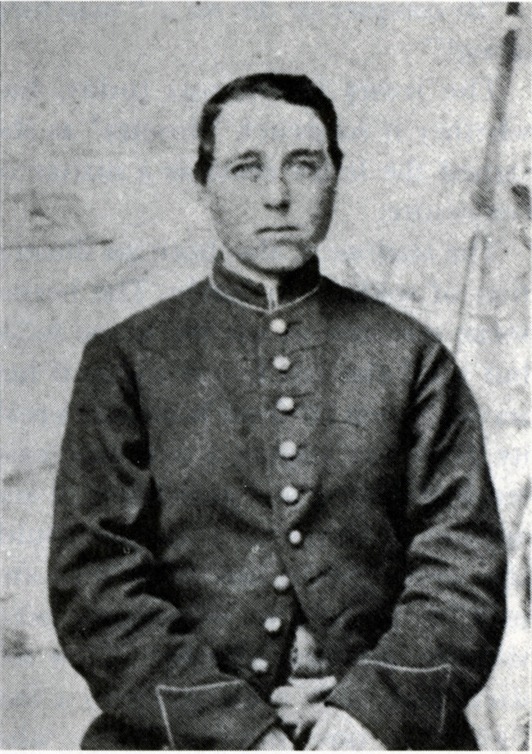 |
| The transgender pride flag |
Albert Cashier
Born Jennie Hodgers in 1843, Cashier joined the Union Army at age 19. Born in Ireland, Cashier immigrated to Illinois, where he lived as a man, working as a shepherd for a local farmer. When the Civil War came around, Albert joined the 95th Illinois Infantry.
Now, getting into the army was significantly easier in Albert's day. There was no intense physical, or even a test for infectious diseases. According to Albert, all he had to do was show his hands and feet, and meet the height requirement. Sub-sequentially, the Union army was completely in the dark about Cashier's assigned gender.
 |
| Albert Cashier in his Union Army uniform. |
After the war, Albert went back to Illinois, where he took up a variety of odd jobs. He lived privately, and kept to himself. In 1910, Senator Ira Lish, Cashier's employer at the time, accidentally hit Albert with his scar. His leg broke, and when he was taken to the doctor, his secret was discovered. However, Albert persuaded the doctor and the senator to keep quiet, and the senator arranged for him to relocate to the Soldier's and Sailor's Home, where he would be looked after.
In 1914, Cashier, suffering from dementia, was sent to the state asylum. It was only then that Cashier's assigned gender became widely known. The US government tried to convict him of fraudulently collecting a veteran's pension, but his comrades defended him, stating that Albert Cashier was a brave soldier who had every right to call himself a veteran. His comrades convinced the US government to back off, but were unable to convince the state asylum to let Albert continue to live as a man. After discovering Albert's assigned gender, the state asylum relegated him to the women's quarter, and forced him to wear skirts for the first time in 50 years. Albert's mental and physical health rapidly deteriorated, and ended up breaking a hip after tripping over his long skirts one day. The hip grew infected, and Albert died soon after.
Though he was forced to dress as a woman at the end of his life, Albert Cashier was buried in his Union Army uniform, and is listed as 'Albert Cashier' on his tombstone. He received full military honors at his funeral.
James Barry
Probably born Margaret Ann Bukeley, James Barry was one of the first surgeons to perform a Cesarean section where both the mother and the child lived. He insisted on hospital reform, prison reform, and certifying all medical practitioners. I'd say he was the surgeon version of Florence Nightingale, except the pair absolutely despised each other, and the comparison would undoubtedly infuriate both of them.
 |
| A contemporary painting of Barry. |
Despite the fact that everyone thought he was too young to be a doctor, Barry joined the army as a surgeon in 1813. In 1816 (or 1817), Barry was sent to Cape Town, South Africa, where he would really start to make his mark.
Appalled at the conditions, James insisted on finding a way to bring clean water into the city. He insisted on hospital cleanliness for both white and black patients, pushed for prisoners to be treated humanely, and insisted that the families of both soldiers and prisoners be treated better. He drew the ire of the local medical establishment when he insisted that every doctor and nurse pass a medical examination. His reforms led to the Cape Town hospitals being some of the safest in the British Empire, as well as him being promoted to the medical equivalent of a Brigadier General.
| Barry in 1862 |
He left Cape Town after being accused of a scandalous affair with Lord Charles Sommerset. From South Africa Barry went to the West Indies, then to Canada, not returning to England until 1859. He died in 1865, and, despite his request that he be buried in his clothing, and body not be washed the woman who prepared him for burial found out that James Barry had not been born a man.
James Barry is often counted among the great women doctors of history, despite the fact that Barry referred to himself as a man, and made no indication that he was female from the time he entered medical school. Barry exclusively referred to himself as male, and there is no evidence suggesting that he wasn't.
Roberta Cowell
Roberta, born Robert, Cowell is most noted for being the first transgender person to undergo the sex change surgery from male to female, but in addition to that she was a pilot in WWII, flying Spitfire and Tiger Moth airplanes. |
| Roberta Cowell |
From an early age, Roberta showed an interest in planes and cars. She attended London University, earning a degree in engineering. In 1941 Roberta joined the Royal Air Force, despite the fact that she often got motion sickness when flying. Roberta flew several different missions into occupied Norway and France. In 1944 her plane was shot down, and she was captured by the Germans. She spent the last five months of the war as a prisoner.
After the war, Roberta returned home to her wife and children. She built up a semi-successful business, and was an avid road racer. However, she began to feel depressed and purposeless. After seeing psychologists for three years, Robert decided to leave her family, and transition from male to female.
In Summation
This is, obviously, in no way a complete list of amazing transgender people who have served in their country's military, there are many, many more. It is important to remember these people's contributions, and to remember that transgender people have contributed militarily to their countries just the same as cisgender people have. History is important, because it gives us the ability to make connections with and better understand the present. I hope that you'll keep Cashier, Barry, and Cowell's stories in mind, and stand up for them and the hundreds of thousands like them next time your transphobic uncle comes around for dinner, and take a moment to educate your friends and family about the excellent contributions trans people have made to their countries.
Sources
Albert Cashier's Secret
Jennie Hodgers, aka Private Albert Cashier
Jennie Hodgers
Remembering Albert Cashiers, Illinois' Civil War Hero, and Transgender Trailblazer
Albert D. J. Cashier: Woman Warrior, Insane Civil War Veteran, or Transman?
The Extraordinary Secret Life of Dr. James Barry
Dr. James Barry: A Woman Ahead of Her Time
Secret Transgender Victorian Surgeon Feted by Historic England Society
Dr. James Barry and the Specter of Trans and Queer History
A Note on Dr. James Barry
The True Story Behind Britain's First Transgender Woman
Forgotten Women: The Life and Death of Roberta Cowell
'It's easier to change a body than change a mind': The Extraordinary Life and Lonely Death of Roberta Cowell
The Incredible Story of the Spitfire Pilot Who Became a Woman, And Fell In Love With The Female Student Who Became a Man (title is misleading, but the article contains good information about Roberta.)
Sex Change Spitfire Ace
